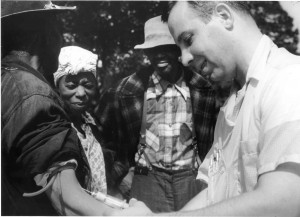Tue 3 Feb, 2009
Black mistrust of the medical profession
Comment now Filed under: Thinking about race, privilege and inequalityTags: Health and health care, Privilege, Racial inequality
 I’m often asked to discuss whether there are distinctive attitudes within the “black community” in such areas as education, medical care, and the government. The question can take a relatively benign form, wondering where such attitudes might have originated and how they might be addressed. At other times, I’m told angrily that blacks are responsible for their own problems, and that our history of race is irrelevant, because blacks supposedly do not value education or hard work, or that they fail to exhibit constructive attitudes towards authority figures in such areas as law enforcement, the justice system, the medical community, and education.
I’m often asked to discuss whether there are distinctive attitudes within the “black community” in such areas as education, medical care, and the government. The question can take a relatively benign form, wondering where such attitudes might have originated and how they might be addressed. At other times, I’m told angrily that blacks are responsible for their own problems, and that our history of race is irrelevant, because blacks supposedly do not value education or hard work, or that they fail to exhibit constructive attitudes towards authority figures in such areas as law enforcement, the justice system, the medical community, and education.
There are difficult issues involved in this topic: are there, in fact, distinctive attitudes among black Americans towards civic or community values and institutions which are held in high esteem by most white Americans? If so, how widespread are these attitudes? Where and how might these attitudes have originated? Is there a connection to our long history of slavery and racial discrimination? What steps might be taken to begin to address this situation?
On the first issue, there is a new study available in the February issue of the Archives of Pediatrics & Adolescent Medicine which suggests a significantly higher degree of mistrust among black Americans towards medical research than among whites.
The study specifically examined the attitudes expressed by black and white parents towards having their children participate in medical research. The study may thus invoke not simply attitudes towards medical care, but specifically suspicion on the part of many black Americans about the motives of medical researchers.
Some may find the results of this study to be blindingly obvious. And certainly any mistrust among black parents regarding medical research, especially involving their own children, may be quite understandable, given our nation’s terrible history of exploiting black citizens under the guise of clinical research. The Tuskegee syphilis study, in which black patients with syphilis were deliberately left untreated to study the disease, is merely the most notorious example; in that case, medical care and information was withheld from syphilis patients betwen 1932 and 1972, while spouses and children were infected with the disease.
However, as the study’s authors note, this pervasive mistrust of medical research “may present a barrier to enrollment of [black] children in clinical research.” Blacks are already under-represented in medical studies, and this lack of representation can have implications for racial health care disparities.